Charles E W Bean, Diaries, AWM38 3DRL 606/279/1 - 1938-1939 - Part 2
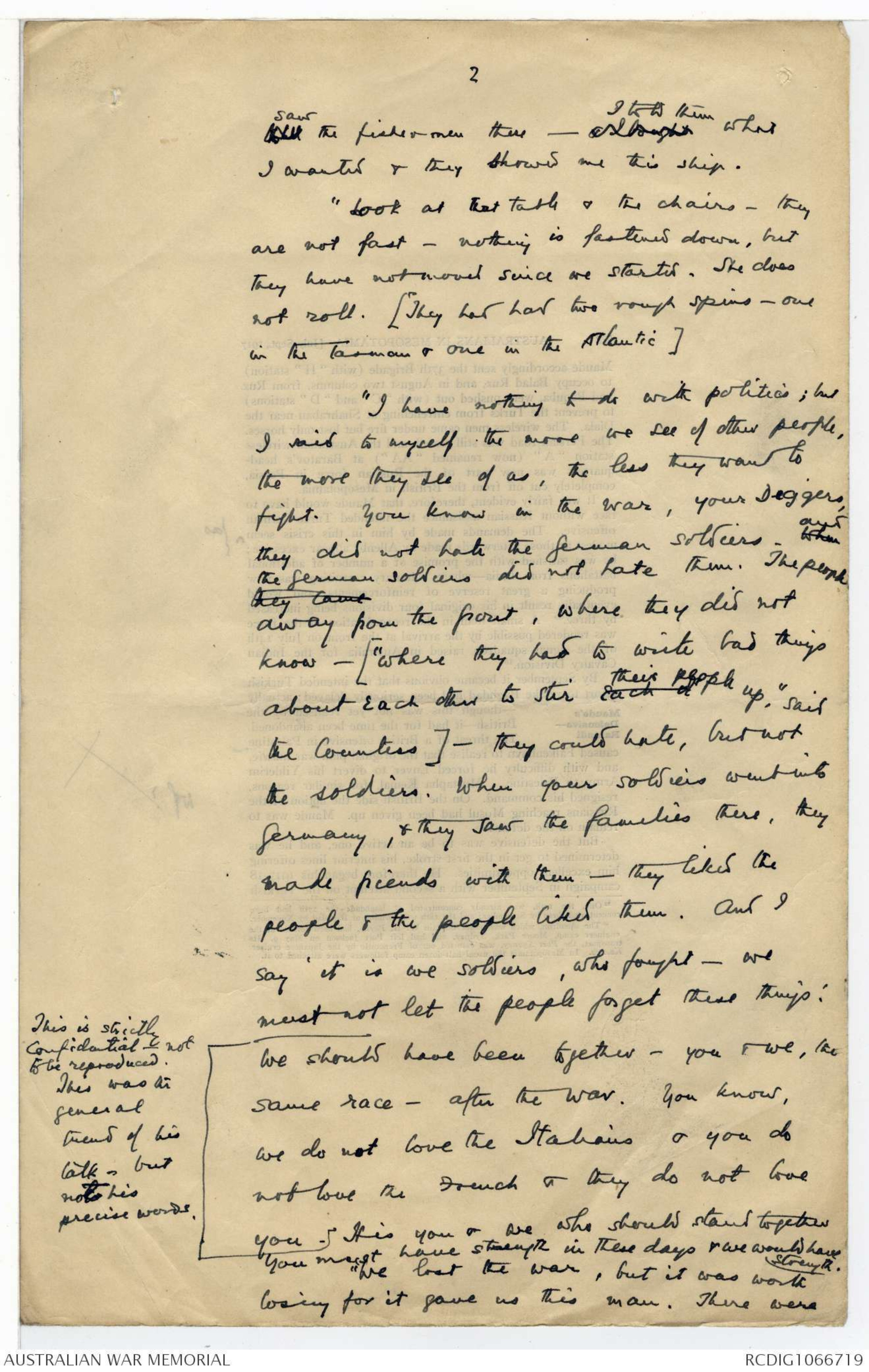
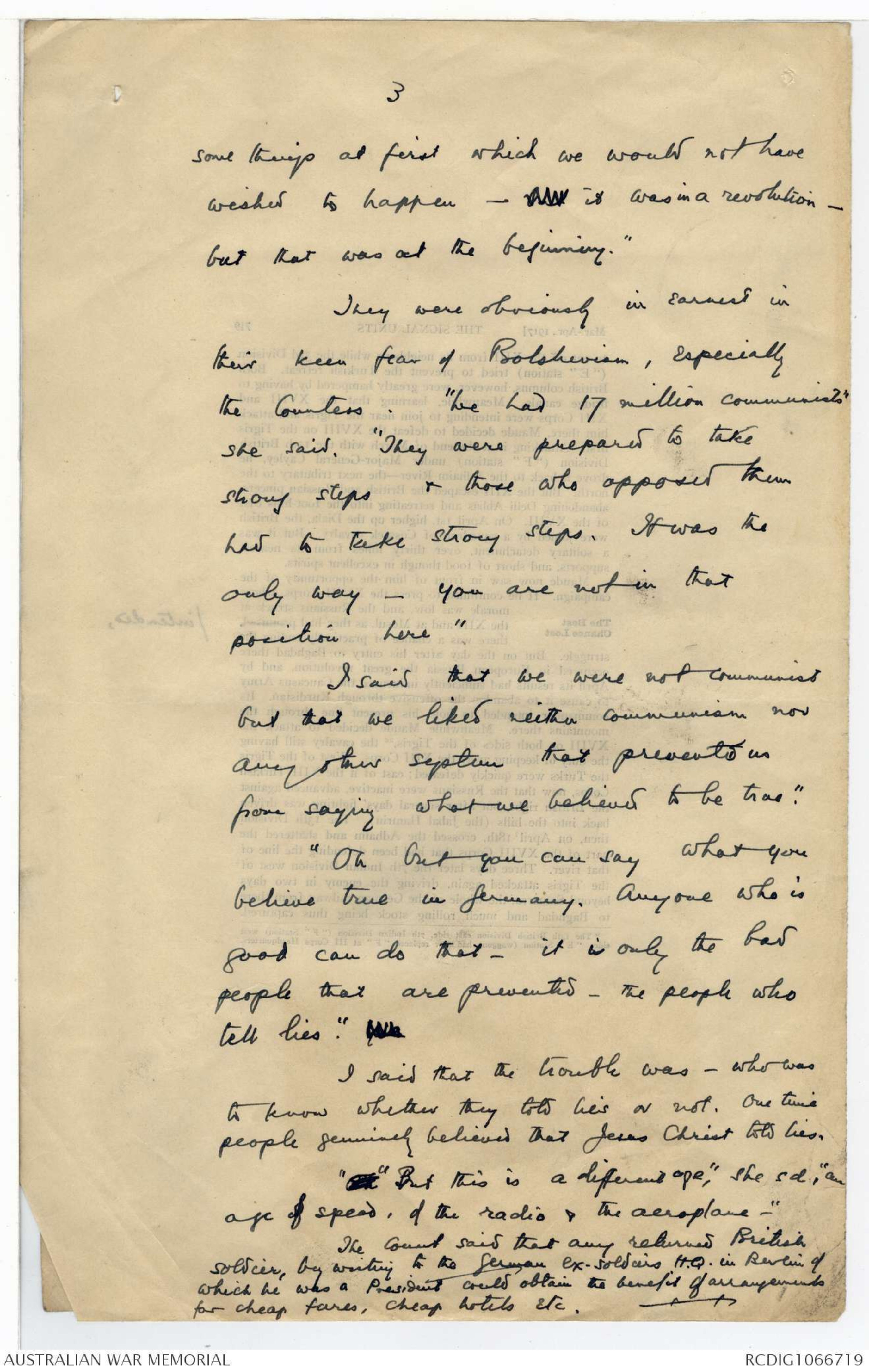
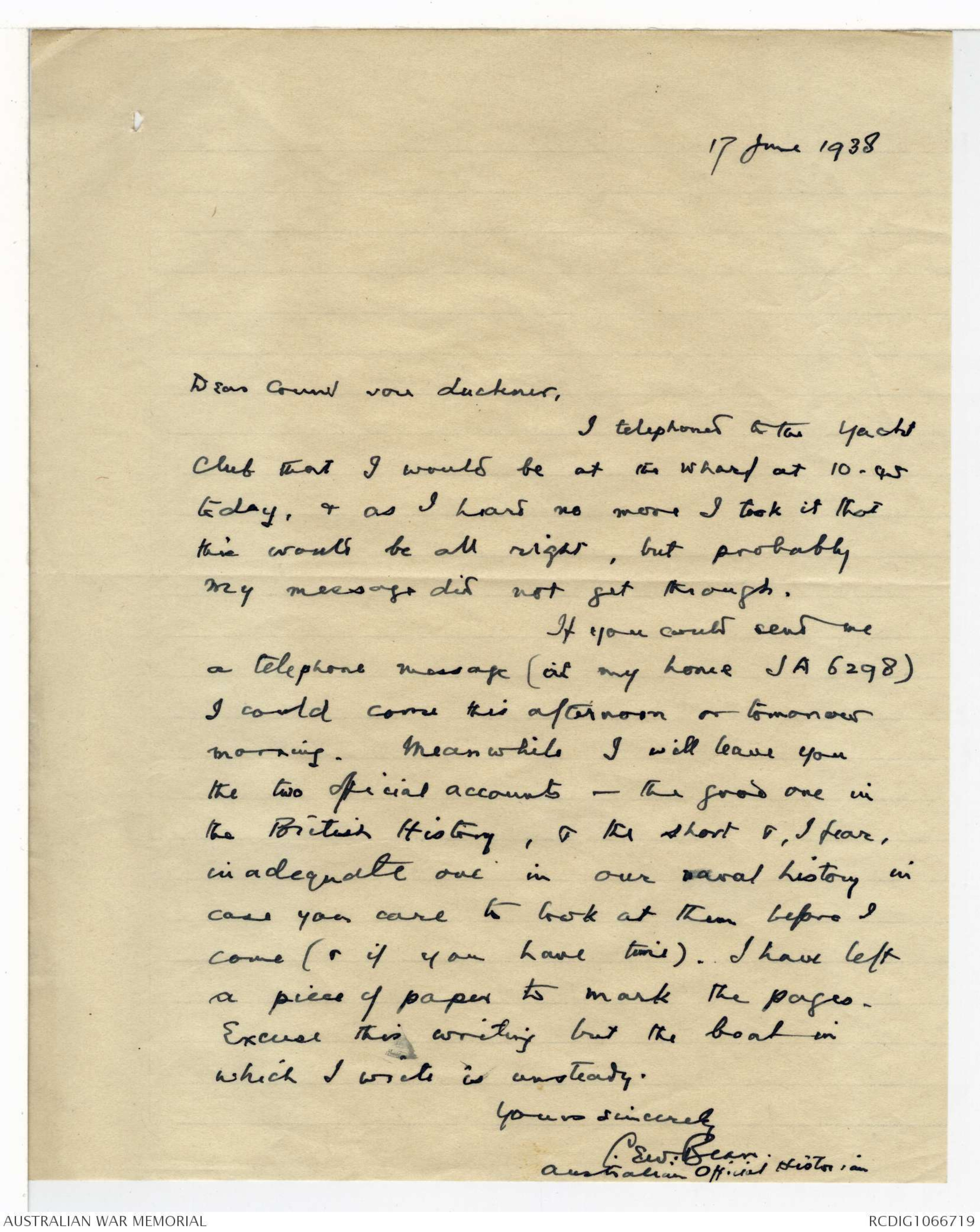
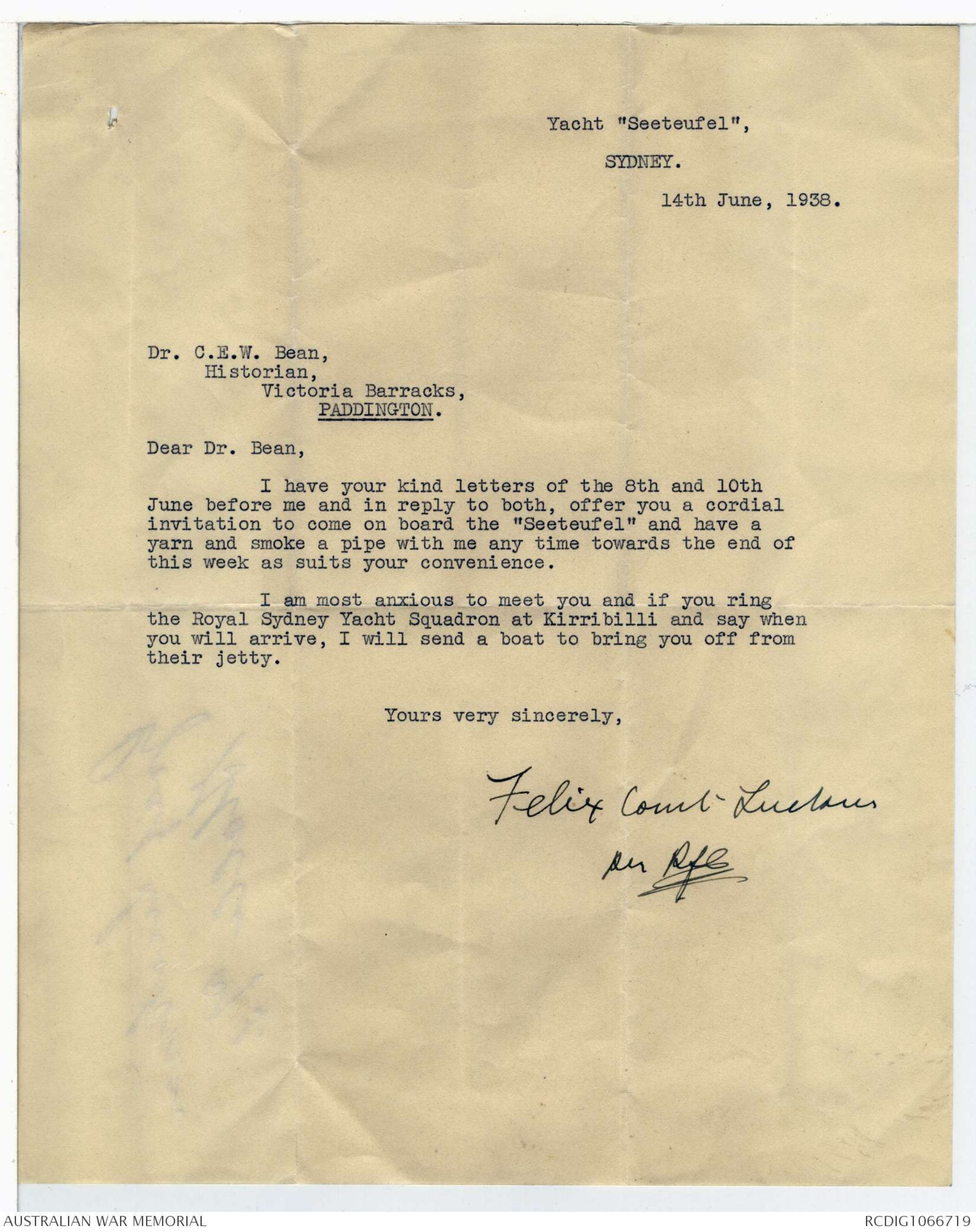
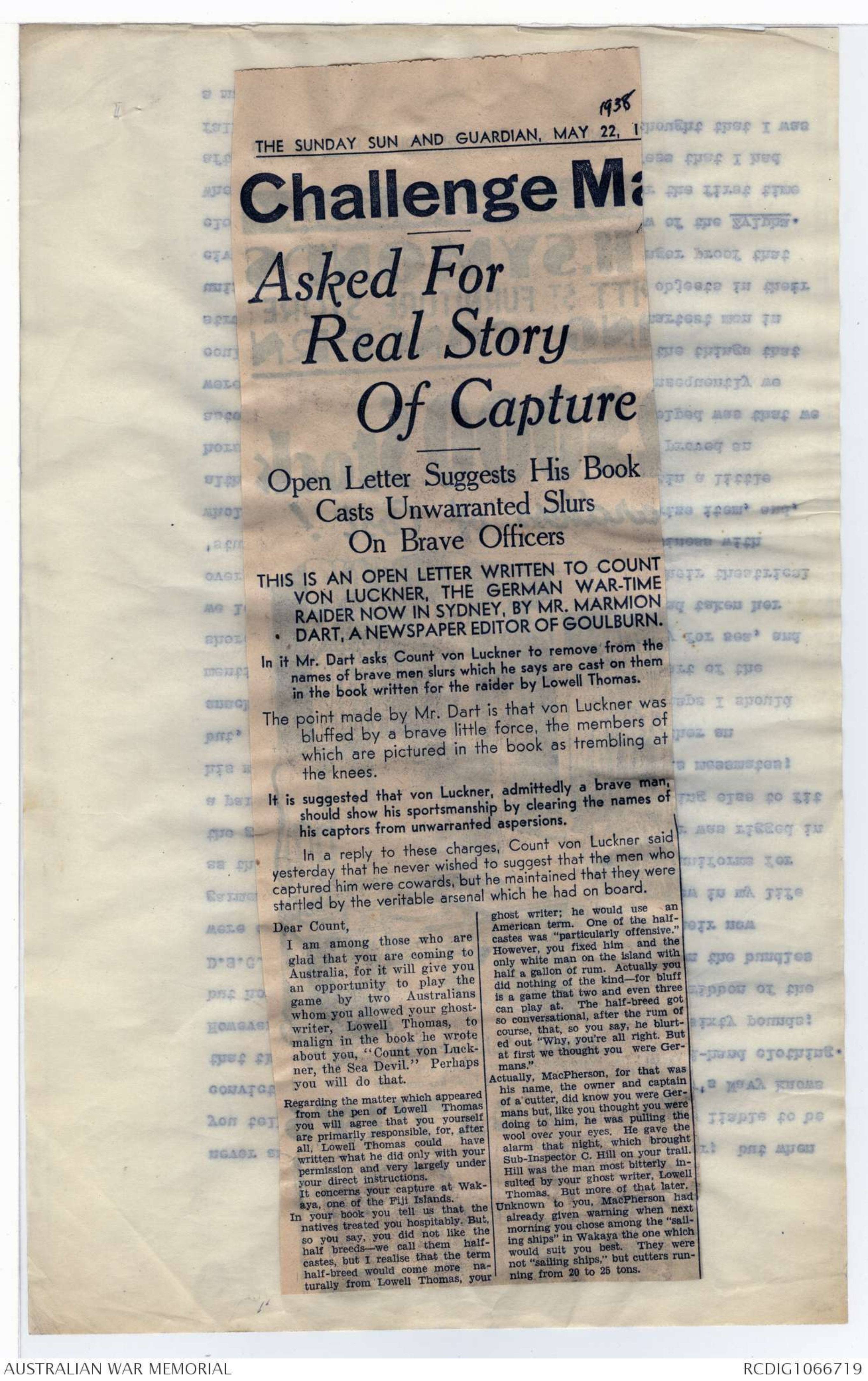
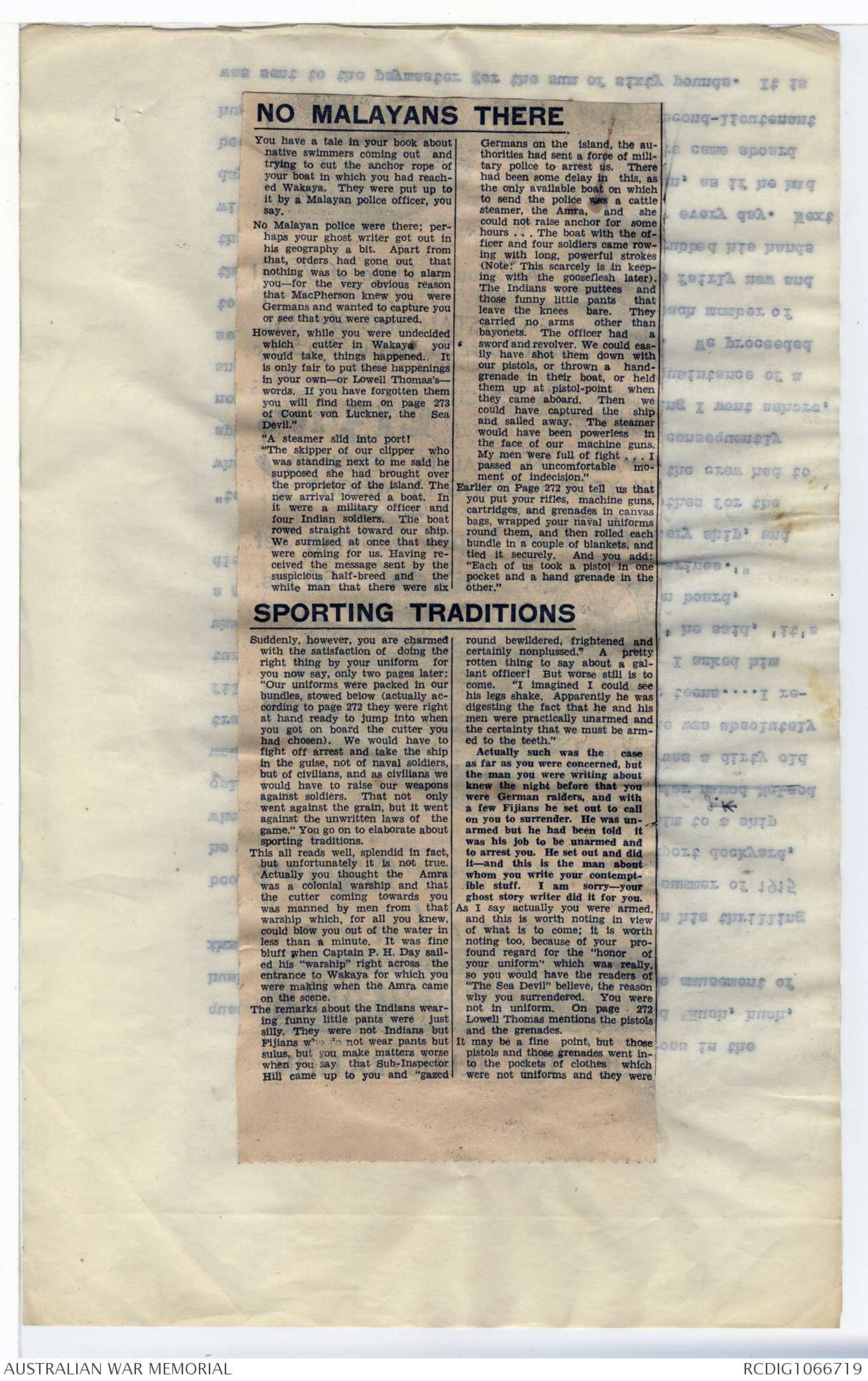
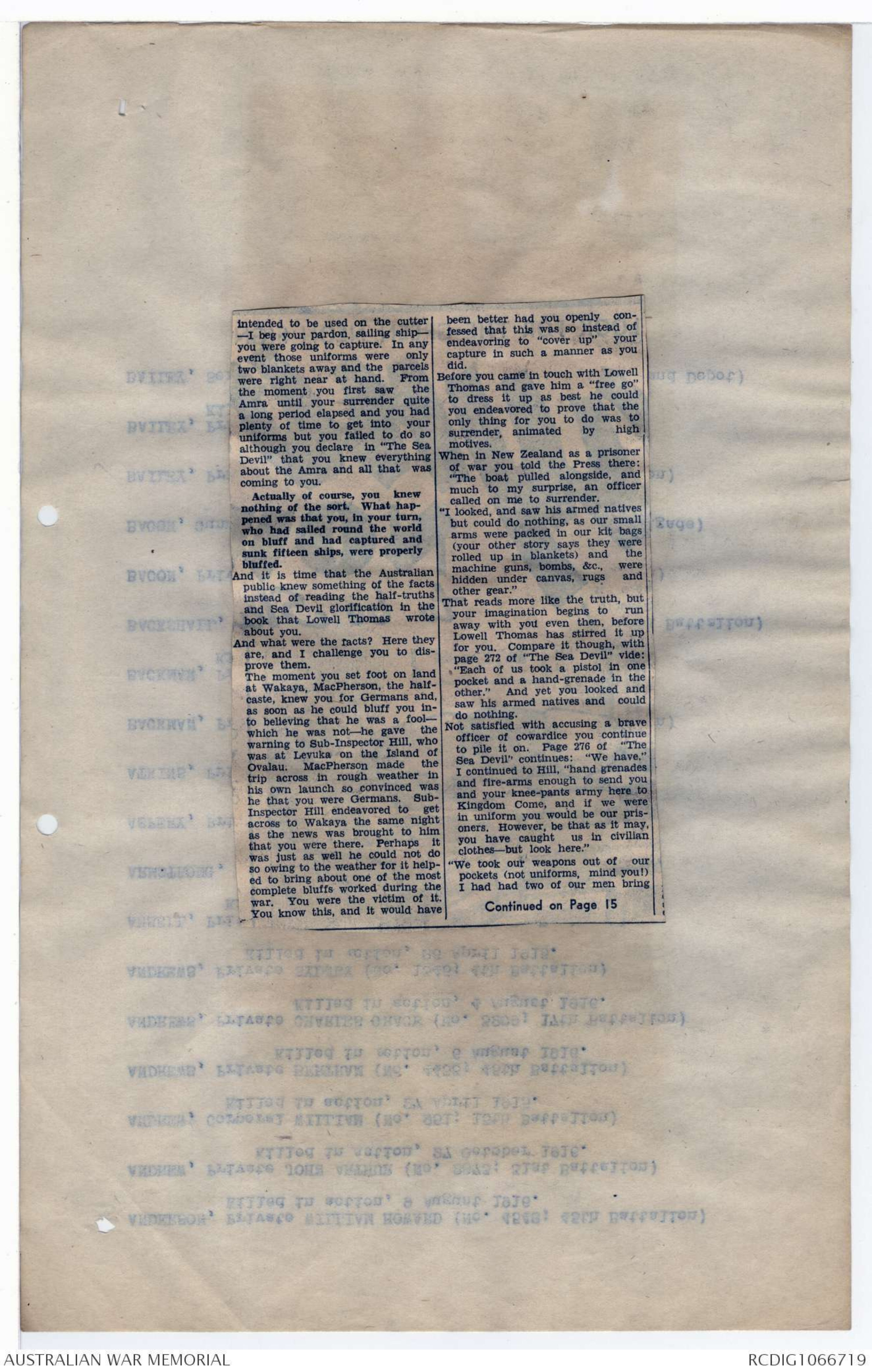
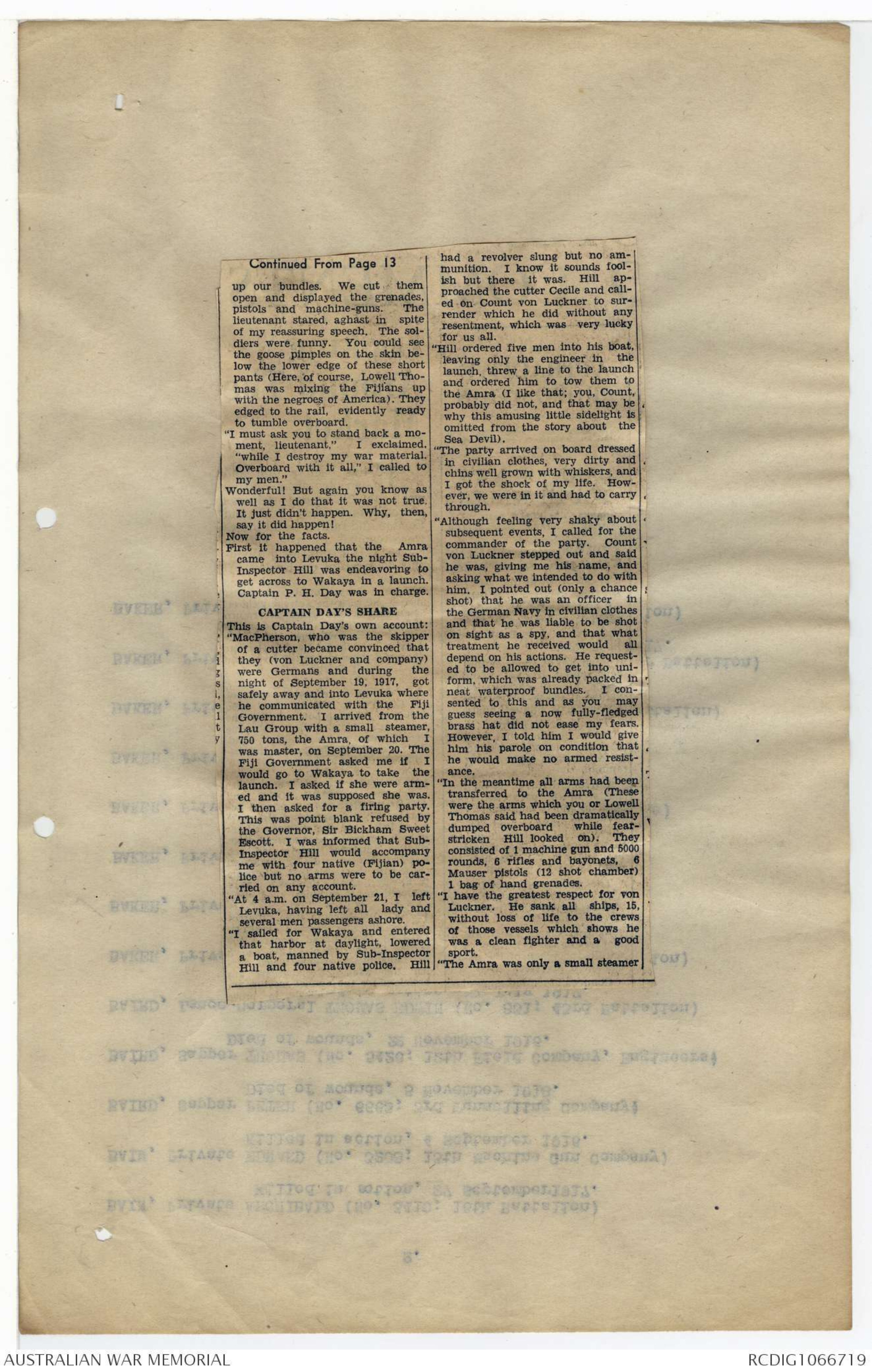
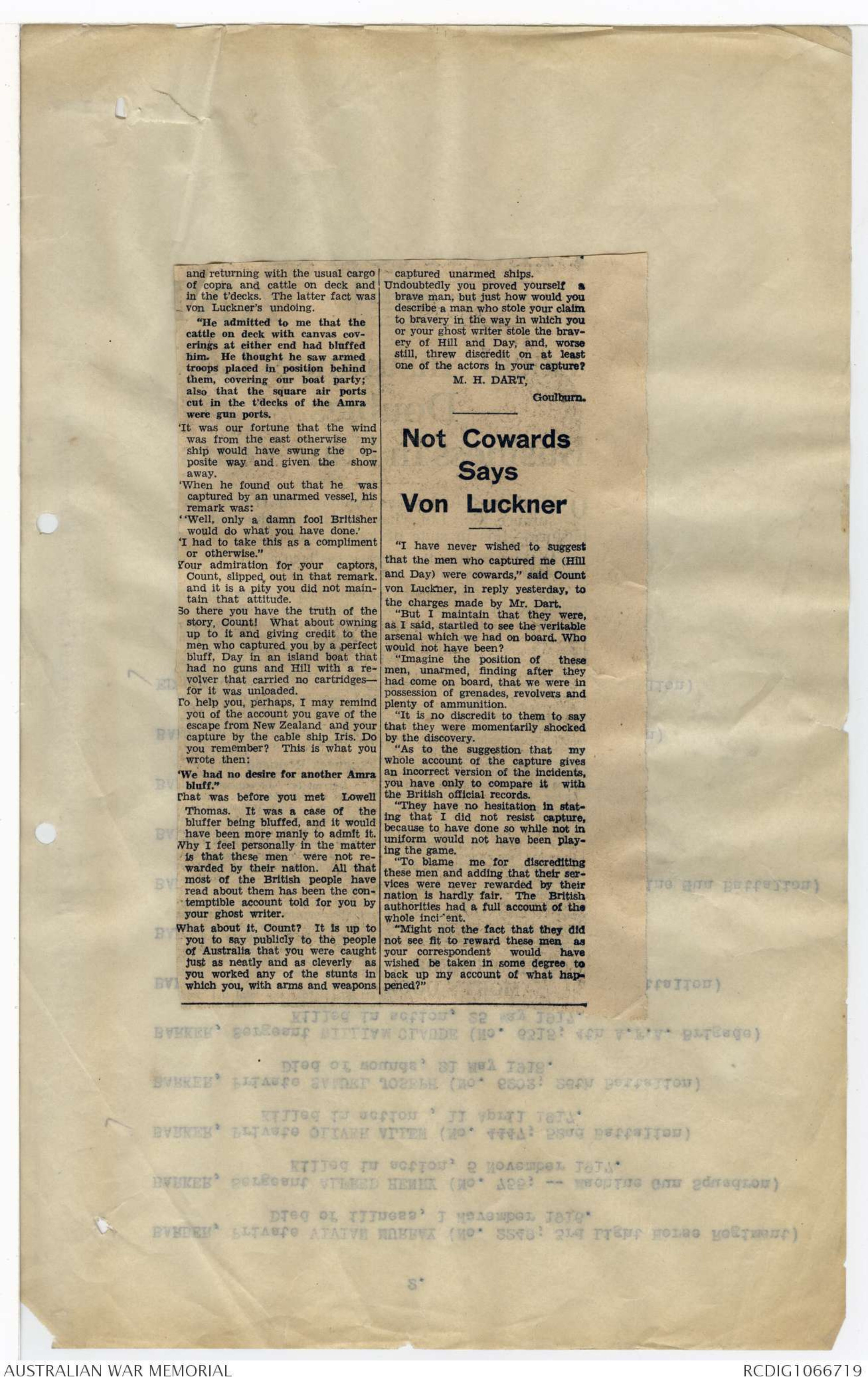
2xxx saw the fishermen there - & I brought I told them what
I wanted & they showed me this ship.
"Look at that table & the chairs - they
are not fast - nothing is fastened down, but
they have not moved since we started. She does
not roll. [They had had two rough spins - one
in the Tasman & one in the Atlantic]
"I have nothing to do with politics; but
I said to myself the more we see of other people,
the more they see of us, the less they want to
fight. You know in the war, your Diggers
they did not hate the German soldiers. When And
the German soldiers did not hate them. The peoplethey came away from the front, where they did not
know – [“where they had to write bad things
about each other to stir each ot their people up.” said
the Countess] - they could hate, but not
the soldiers. When your soldiers went into
Germany, & they saw the families there, they
made friends with them - they liked the
people & the people liked them. And I
say 'it is we soldiers, who fought - we
must not let the people forget these things.'
We should have been together- you & we, the
same race - after the war. You know
we do not love the Italians & you do
not love the French & they do not love
you. It is you & we who should stand together
you might have strength in these days & we would have strength.
[* This is strictly
confidential & not
to be reproduced.
This was the
general trend of his
talk - but
not his
precise words.*]
"We lost the war, but it was worth
losing for it gave us this man. There were
3
some things at first which we would not have
wished to happen - xxx it was in a revolution -
but that was at the beginning.”
They were obviously in earnest in
their keen fear of Bolshevism, especially
the Countess - “We had 17 million communists"
she said. “They were prepared to take
strong steps & those who opposed them
had to take strong steps. It was the
only way - you are not in that
position here.”
I said that we were not communist
but that we liked neither communism nor
any other system that prevented us
from saying what we believed to be true."
“Oh but you can say what you
believe true in Germany. Anyone who is
good can do that - it is only the bad
people that are prevented - the people who
tell lies. “ xxx
I said that the trouble was - who was
to know whether they told lies or not. One time
people genuinely believed that Jesus Christ told lies.
"xxx "But this is a different age, “ she sd, "an
age of speed, of the radio & the aeroplane-"
The Count said that any returned British
soldier, by writing to the German ex- soldiers H.Q. in Berlin of
which he who a President could obtain the benefit of arrangements
for cheap fares, cheap hotels etc.
17 June 1938
Dear Count Von Luckner,
I telephoned to the yacht
club that I would be at the wharf at 10.45
today, & as I heard no more I took it that
this would be all right, but probably
my message did not get through.
If you could send me
a telephone message (at my home JA 6298)
I could come his afternoon or tomorrow
morning. Meanwhile I will leave you
the two official accounts - the good one in
the British History, & the short &, I fear.
inadequate one in our naval history in
case you care to look at them before I
come (& if you have time). I have left
a piece of paper to mark the pages.
Excuse this writing but the boat in
which I write is unsteady
yours sincerely
C.E.W.Bean.
Australian Official Historian
Yacht “ Seeteufel”,
SYDNEY.
14th June, 1938.
Dr. C.E.W. Bean,
Historian,
Victoria Barracks,
PADDINGTON
Dear Dr. Bean,
I have your kind letters of the 8th and 10th
June before me and in reply to both, offer you a cordial
invitation to come on board the “Seeteufel “ and have a
yarn and smoke a pipe with me any time towards the end of
this week as suits your convenience.
I am most anxious to meet you and if you ring
the Royal Sydney Yacht Squadron at Kirribilli and say when
you will arrive, I will send a boat to bring you off from
their jetty.
Yours very sincerely,
Felix Count Luckner
per RFC
1938
THE SUNDAY SUN AND GUARDIAN. MAY 22,
CHALLENGE MA
Asked For
Real Story
Of Capture
Open Letter Suggests His Book
Casts Unwarranted Slurs
On Brave Officers
THIS IS AN OPEN LETTER WRITTEN TO COUNT
VON LUCKNER, THE GERMAN WAR-TIME
RAIDER NOW IN SYDNEY BY MR. MARMION
DART, A NEWSPAPER EDITOR OF GOULBURN.
In it Mr. Dart asks Count von Luckner to remove from the
names of brave men slurs which he says are cast on them
in the book written for the raider by Lowell Thomas.
The point made by Mr. Dart is that von Luckner was
bluffed by a brave little force, the members of
which are pictured in the book as trembling at
the knees.
It is suggested that von Luckner, admittedly a brave men,
should show his sportsmanship by clearing the names of
his captors from unwarranted aspersions.
In a reply to these charges, Count von Luckner, said
yesterday that he never wished to suggest that the men who
captured him were cowards, but he maintained that they were
startled by the veritable arsenal which he had on board
Dear Count,
I am among those who are
glad that you are coming to
Australia, for it will give you
an opportunity to play the
game by two Australians
whom you allowed your ghostwriter,
Lowell, Thomas, to
malign in the book he wrote
about you, “ Count von Luckner,
the Sea Devil." Perhaps
you will do that.
Regarding the matter which appeared
from the pen of Lowell Thomas
you will agree that you yourself
are primarily responsible, for, after
all, Lowell Thomas could have
written what he did only with your
permission and very largely under
your direct instructions.
It concerns your capture at Wakaya,
one of the Fiji Islands.
In your book you tell us that the
natives treated you hospitably. But,
so you say, you did not like the
half breeds—we call them half castes,
but I realise that the term
half-breed would come more naturally
from Lowell Thomas, your
ghost writer: he would use an
American term. One of the half
castes was “particularly offensive”.
However you fixed him and the
only white man on the Island with
half a gallon of rum. Actually you
did nothing of the kind - for bluff
is a game that two and even three
can play at. The half - breed got
so conversational, after the rum of
course, that, so you say, he blurted
out . “ Why you’re alright. But
at first we thought you were Germans.”
Actually, MacPherson, for that was
his name, the owner and captain
of a cutter, did know you were Germans,
but, like you thought you were pulling the
wool over his eyes, he was pulling the
wool over your eyes. He gave the
alarm that night, which brought
Sub - Inspector C Hill on your trail.
Hill was the man most bitterly insulted
by your ghost writer, Lowell
Thomas. But more of that later.
Unknown to you, MacPherson had
already been given warning when next
morning you chose among the “sailing
ships” in Wakaya the one which
would suit you best. They were
not “sailing ships” but cutters running
from 20 - 25 tons.
NO MALAYANS THERE
You have a tale in your book about
native swimmers coming out and
trying to cut the anchor rope of
your boat in which you had reached
Wakaya. They were put up to
it by a Malaya. Police officer, you
say.
No Malayan police were there;
perhaps your ghost writer got out in
his geography a bit. Apart from
that, orders, had gone out that
nothing was to be done to alarm
you - for the very obvious reason
that MacPherson knew you were
Germans and wanted to capture you
or see that you were captured.
However, while you were undecided
which cutter in Wakaya you
would take, things happened. It
is only fair to put these happenings
in your own—or Lowell Thomas’s -
words. If you have forgotten them
you will find them on page 273
of Count von Luckner, the Sea
Devil."
“A steamer slid into port!
“The skipper of our clipper who
was standing next to me said he
supposed she had brought over
the proprietor of the Island. The
new arrival lowered a boat. In
it were a military officer and
four Indian soldiers. The boat
rowed straight toward our ship.
We surmised at once that they
were coming for us. Having
received the message sent by the
suspicious half- breed and the
white man that there were six
Germans on the island, the authorities
had sent a force pf military
police to arrest us. There
had been some delay in this, as
the only available boat on which
to send the police was a cattle
steamer, the Arma, and she
could not raise anchor for some
hours...The boat with the officer
and four soldiers came rowing
with long, powerful strokes
(Note: This scarcely in in keeping
with the gooseflesh later).
The Indians wore puttees and
those funny little pants that
leave the knees bare. They
carried no arms other than
bayonets. The officer had a
sword and revolver. We could easily
have shot him down with
our pistols, or thrown a hand-grenade
in their boat, or held
them up at pistol-point when
they came aboard. Then we
could have captured the ship
and sailed away. The steamer
would have been powerless in
the face of our machine guns.
My men were full of fight ...I
passed an uncomfortable moment
of indecision."
Earlier on Page 272 you tell us that
you put your rifles, machine guns,
cartridges, and grenades in canvas
bags, wrapped your naval uniforms
round them, and rolled each
bundle in a couple of blankets, and
tied it securely. And you add:
"Each of us too a pistol in one
pockets and a hand grenade in the "
other."
SPORTING TRADITIONS
Suddenly, however, you are charmed
with the satisfaction of doing the
right thing by your uniform for
you now say, only two pages later:
"Our uniforms were packed in our
bundles, stowed below (actually according
to page 272 they were right
at hand ready to jump into when
you got on board the cutter you
had chosen). We would have to
fight off arrest and take the ship
in the guise, not of naval soldiers,
but of civilians, and as civilians we
would have to raise our weapons
against soldiers. That not only
went against the grain, but it went
against the unwritten laws of the
game." You go on to elaborate about
sporting traditions.
This all reads well, splendid in fact,
but unfortunately it is not true.
Actually you thought the Amra
was a colonial warship and that
the cutter coming towards you
was manned by men from that
warship which, for all you knew,
could blow you out of the water in
less than a minute. It was fine
bluff when Captain P. H. Day sailed
his "warship" right across the
entrance to Wakaya for which you
were making when the Amra came
on the scene.
The remarks about the Indians wearing
funny little pants were just
silly. They were not Indians but
Fijians who do not wear pants but
sulus, but you make matters worse
when you say that Sub-Inspector
Hill came up to you and "gazed
round bewildered, frightened and
certainly nonplussed." A pretty
rotten thing to say about a gallant
officer! But worse still is to
come. "I imagined I could see
his legs shake. Apparently he was
digesting the fact that he and his
men were practically unarmed and
the certainty that we must be armed
to the teeth."
Actually such was the case
as far as you were concerned, but
the man you were writing about
knew the night before that you
were German raiders, and with
a few Fijians he set out to call
on you to surrender. He was unarmed
but he had been told it
was his job to be unarmed and
to arrest you. He set out and did
it and this is the man about
whom you write your contemptible
stuff. I am sorry—your
ghost story writer did it for you.
As I say actually you were armed,
and this is worth noting in view
of what is to come; it is worth
noting too, because of your profound
regard for the "honor, of
your uniform" which was really,
so you would have the readers of
The "Sea Devil" believe, the reason
why you surrendered. You were
not in uniform. On page 272
Lowell Thomas mentions the pistols
and the grenades.
It may be a fine point, but those
pistols and those grenades went into
the pockets of clothes which
were not uniforms and they were
intended to be used on the outer
—I beg your pardon, sailing ship
you were going to capture. In any
event those uniforms were only
two blankets away and the parcels
were right near at hand. From
the moment you first saw
Amra until your surrender quite
a long period elapsed and you had
plenty of time to get into your
uniforms but you failed to do so
although you declare in “The Sea
Devil” that you knew everything
about the Amra and all that was
coming to you.
Actually of course, you knew
nothing of the sort. What happened
was that you, in your turn,
who had sailed round the world
on bluff and had captured and
sunk fifteen ships, were properly
bluffed.
And it is time that the Australian
public knew something of the facts
instead of reading the half-truth.
and Sea Devil glorification in the
book that Lowell Thomas wrote
about you.
And what were the facts? Here they
are, and I challenge you to disprove
them.
The moment you set foot on land
at Wakaya, MacPherson, the half-
caste, knew you for Germans and
as soon as he could bluff you into
believing that he was a fool—
which he was not—he gave the
warning to Sub-Inspector Hill, who
was at Levuka on the Island of
Ovalau. MacPherson made the
trip across in rough weather in
his own launch so convinced was
he that you were Germans. Sub-
Inspector Hill endeavored to get
across to Wakaya the same night
as the news was brought to him
that you were there. Perhaps it
was just as well he could not do
so owing to the weather for it helped
to bring about one of the most
complete bluffs worked during the
war. You were the victim of it.
You know this, and it would have
been better had you openly confessed
that this was so instead of
endeavoring to coverup, your
capture in such a manner as you
did.
(Before you came in touch with Lowell
Thomas and gave him a “free go”
to dress it up as best he could
you endeavored to prove that the
only thing for you to do was to
surrender, animated by high
motives.
When in New Zealand as a prisoner
of war you told the Press there:
“The boat pulled alongside, and
much to my surprise, an officer
called on me to surrender.
I looked, and saw his armed natives
but could do nothing, as our small
arms were packed in our kit bags
(your other story says they were
rolled up in blankets) and the
machine guns, bombs, &c., were
hidden under canvas, rugs and
other gear.”
That reads more like the truth, but
your imagination begins to run
away with you even then, before
Lowell Thomas has stirred it up
for you. Compare it though, with
page 272 of “The Sea Devil” vide:
“Each of us took a pistol in one
pocket and a hand-grenade in the
other.” Yet you looked and
saw his armed natives and could
do nothing.
Not satisfied with accusing a brave
officer of cowardice you continue
to pile it on. Page 276 of “The
Sea Devil” continues: “ We have,”
I continued to Hill. hand grenades
and fire-arms enough to send you
and your knee-pants army here to
Kingdom Come, and If we were
in uniform you would be our prisoners.
However, be that as it may,
you have caught us in civilian
clothes—but look here.”
“We took our weapons out of our
pockets (not uniforms, mind you!)
I had had two of our men bring
Continued on Page 15
Continued from Page 13
up or bundles. We cut them
open and displayed the grenades,
pistols and machine-guns. The
lieutenant stared, aghast in spite
of my reassuring speech. The soldiers
were funny. You could see
the goose pimples on the skin below
the lower edge of these short
pants (Here, of course, Lowell Thomas
was mixing the Fijians up
with the negroes of America). They
edged to the rail, evidently ready
to tumble overboard.
“I must ask you to stand back a moment,
lieutenant,” I exclaimed.
“while I destroy my war material.
Overboard with it all,” I called to
my men.”
Wonderful! But again you know as
well as I do that it was not true.
It just didn’t happen. Why, then,
say it did happen!
Now for the facts.
First it happened that the Amra
came into Levuka the night Sub-
Inspector Hill was endeavoring to
get across to Wakaya in a launch.
Captain P. H. Day was in charge
CAPTAIN DAY’S SHARE
This is Captain Day's own account:
“MacPherson, who was the skipper
of a cutter became convinced that
they (von Luckner and company)
were Germans and during the
night of September 19, 1917,
safely away and into Levuka where
he communicated with the Fiji
Government. I arrived from the
Lau Group with a small steamer,
750 tons, the Amra, of which I
was master, on September 20. The
Fiji Government asked me if I
would go to Wakaya to take the
launch. I asked if she were armed
and it was supposed she was.
I then asked for a firing party
This was point blank refused by
the Governor, Sir Bickham Sweet
Escott. I was informed that Sub-
Inspector Hill would accompany
me with four native (Fijian) police
but no arms were to be carried
on any account.
“At 4 a.m. on September 21, I left
Levuka, having left all lady and
several men passengers ashore.
“I sailed for Wakaya and entered
that harbor at daylight, lowered
a boat, manned by Sub-Inspector
Hill and four native police. Hill
had a revolver slung but no ammunition.
I know it sounds foolish
but there it was. Hill approached
the cutter Cecile and called
on Count von Luckner to surrender
which he did without any
resentment, which was very lucky
for us all.
“HiIl ordered five men into his boat,
leaving only the engineer in the
launch, threw a line to the launch
and ordered him to tow them to
the Amra (I like that; you, Count,
probably did not, and that may be,
why this amusing little sidelight is)
omitted from the story about the
Sea Devil).
“The party arrived on board dressed
in civilian clothes, very dirty and
chins well grown with whiskers, and
I got the shock of my life. However,
we were in it and had to carry
through.
“Although feeling very shaky about
subsequent events, I called for the
commander of the party. Count
von Luckner stepped out and said
he was, giving me his name, and
asking what we intended to do with
him. I pointed out (only a chance
shot) that he was an officer in
the German Navy in civilian clothes
and that he was liable to be shot
on sight as a spy, and that what
treatment he received would all
depend on his actions. He requested
to be allowed to get into uniform,
which was already packed in)
neat waterproof bundles. I consented
to this and as you, may
guess seeing a now fully-fledged
brass hat did not ease my fears.
However, I told him I would give
him his parole on condition that
he would make no armed resistance.
“In the meantime all arms had been
transferred to the Amra (These
were the arms which you or Lowell
Thomas said had been dramatically
dumped overboard while fear-stricken
Hill looked on). They
consisted of 1 machine gun and 5000
rounds, 6 rifles and bayonets, 6
Mauser pistols (12 shot chamber)
1 bag of hand grenades.
“I have the greatest respect for von
Luckner. He sank all ships, 15,
without loss of life to the crews
of those vessels which shows he
was a clean fighter and a good
sport.
“The Amra was only a small steamer
and returning with the usual cargo
of copra and cattle on deck and
in the t’decks. The latter fact was
von Luckner’s undoing.
“He admitted to me that the
cattle on deck with canvas coverings
at either end had bluffed
him. He thought he saw armed
troops placed in position behind
them, covering our boat party;
also that the square air ports
cut in the t’decks of the Amra
were gun ports.
‘It was our fortune that the wind
was from the east otherwise my
ship would have swung the opposite
way and given the show
away.
‘When he found out that he was
captured by an unarmed vessel, his
remark was:
“Well, only a damn fool Britisher
would do what you have done.’
‘I had to take this as a compliment
or otherwise.”
Your admiration for your captors,
Count, slipped out in that remark,
and it is a pity you did not maintain
that attitude.
So there you have the truth of the
story, Count! What about owning
up to it and giving credit to the
men who captured you by a perfect
bluff, Day in an island boat that
had no guns and Hill with a revolver
that carried no cartridges
for it was unloaded.
To help you, perhaps, I may remind
you of the account you gave of the
escape from New Zealand and your
capture by the cable ship Iris. Do
you remember? This is what you
-wrote then:
‘We had no desire for another Amra
BIuff.”
That was before you met: Lowell
Thomas. It was a case of the
bluffer being bluffed, and it would
have been more manly to admit it.
Why I feel personally in the matter
is that these men were not rewarded
by their nation. All that
most of the British people have
read about them has been the contemptible account told for you by
your ghost writer.
What about it, Count? It is up to
you to say publicly to the people
of Australia that you were caught
just as neatly and as cleverly as
you worked any of the stunts in
which you, with arms and weapons
captured unarmed ships.
Undoubtedly you proved yourself a
brave man, but just how would you
describe a man who stole your claim
to bravery in the way in which you
or your ghost writer stole the bravery
of Hill and Day, and, worse
still, threw discredit on at least
one of the actors in your capture?
M. H. DART,
Goulburn.
Not Cowards
Says
Von Luckner
“I have never wished to suggest
that the men who captured me (Hill
and Day) were cowards,” said Count
von Luckner, in reply yesterday, to
the charges made by Mr. Dart.
“But I maintain that they were,
as I said, startled to see the veritable
arsenal which we had on board. Who
would not have been?
“Imagine the position of these
men, unarmed, finding after they
had come on board, that we were in
possession of grenades, revolvers and
plenty of ammunition.
“It is no discredit to them to say
that they were momentarily shocked
by the discovery.
“As to the suggestion that my
whole account of the capture gives
an incorrect version of the incidents,
you have only to compare it with
British official records.
“They have no hesitation in stating
that I did not resist capture,
because to have done so while not in
uniform would not have been playing
the game.
“To blame me for discrediting
these men and adding that their services
were never rewarded by their
nation is hardly fair. The British
authorities had a full account of the
whole incident.
“Might not the fact that they did
not see fit to reward these men as
your correspondent would have
wished be taken in some degree to
back up my account of what happened?”
 Diane Ware
Diane WareThis transcription item is now locked to you for editing. To release the lock either Save your changes or Cancel.
This lock will be automatically released after 60 minutes of inactivity.